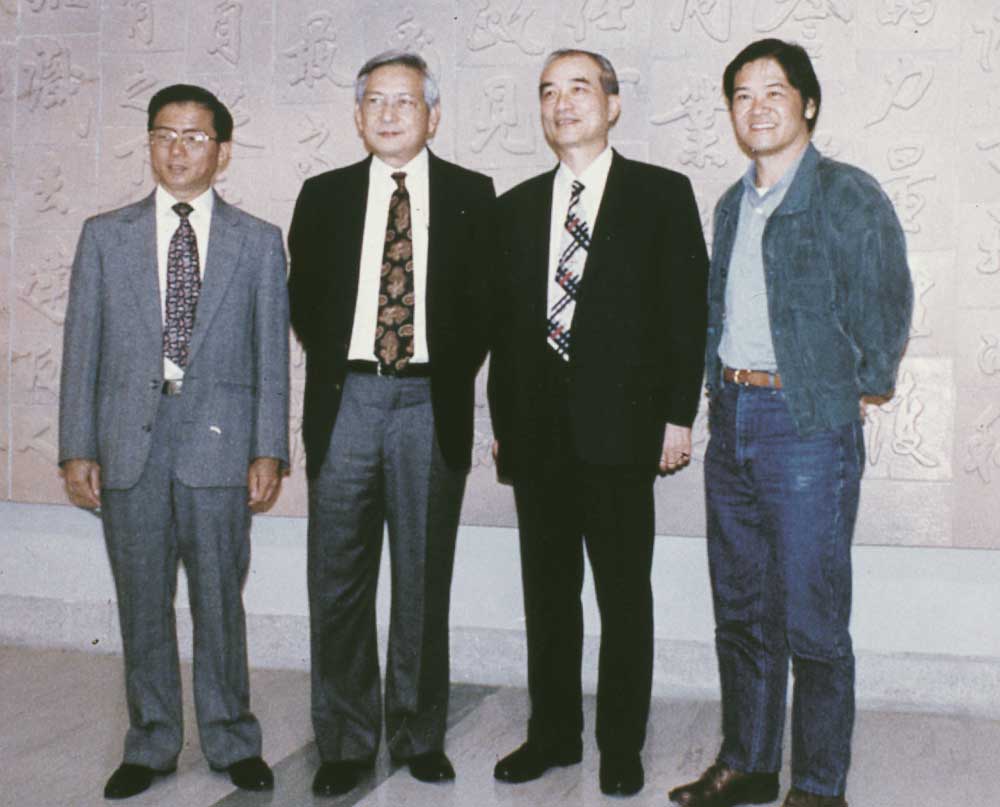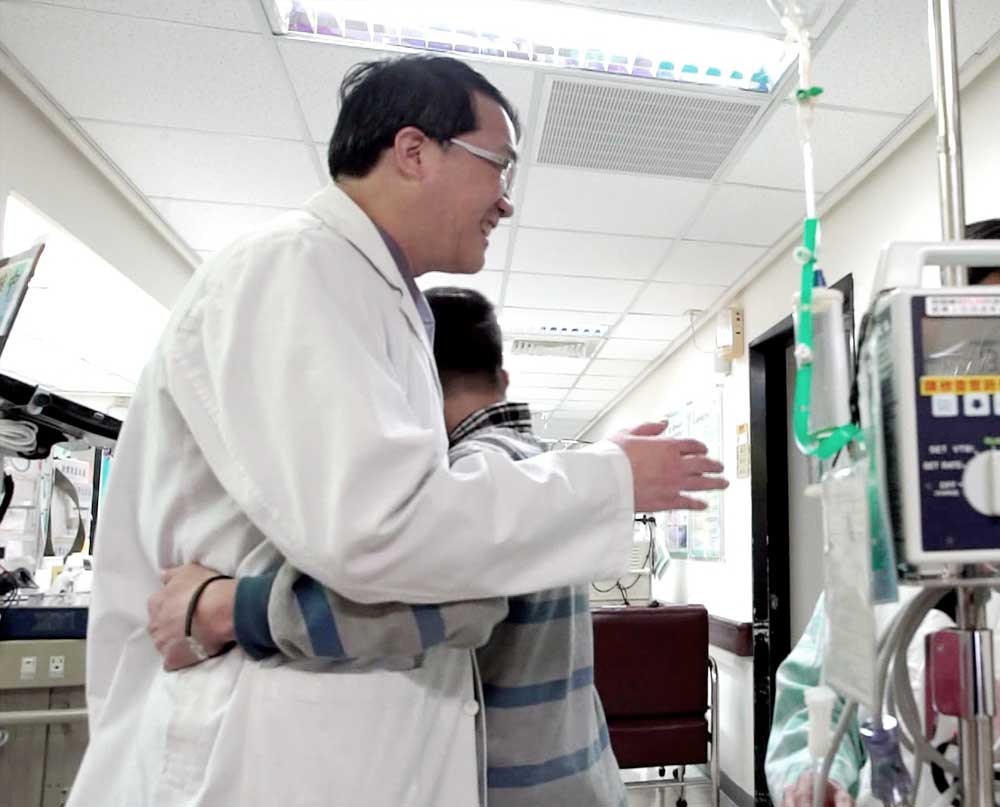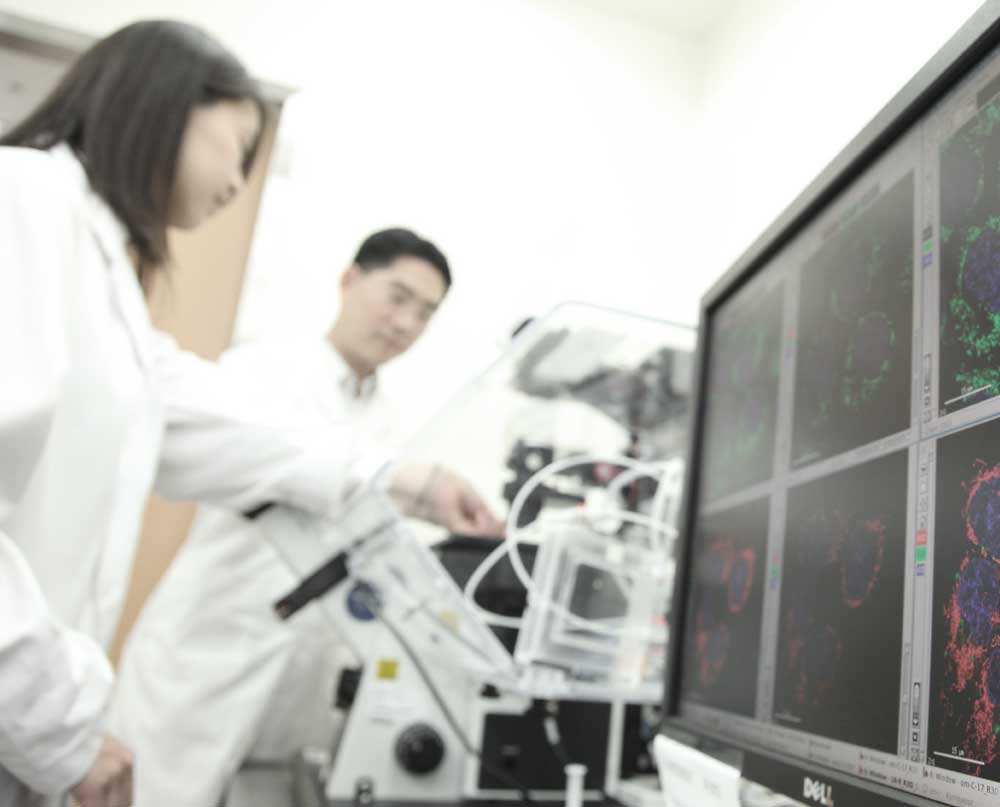From the fall of 1986 to the summer of 1988, students from the School of Post-Baccalaureate Medicine, NCKU went on an “exodus” to the College of Medicine, NTU, for clinical education. Teachers and students in the first class of the School of Post-Baccalaureate Medicine, NCKU posed for a photo during their field studies at NTU. (Courtesy of College of Medicine, NCKU)
Unwavering Perseverance in Safeguarding Public Health Amidst Challenging Times
Founding the College of Medicine and the NCKU Hospital for Southern Taiwan
In 1980, Prof. Han-min Xia, then President of NCKU, set two major goals for the university: to develop NCKU into a comprehensive university, and to close the gap of healthcare between northern and southern Taiwan by improving the quality of medical services in the south. Accordingly, President Xia strove to establish the College of Medicine and the NCKU Hospital, creating the first university-based medical center in Taiwan since 1949.
To safeguard the public welfare of their hometown, Prof. Kun-Yen Huang and his colleagues worked tirelessly to solicit support and resources for the establishment of the College of Medicine in 1983. When the NCKU Hospital was opened to the public in 1988, it was the first hospital in southern Taiwan to be operated by the medical school of a national university. Based on medical ethics and humanitarian principles advocated by Prof. Huang, the NCKU Hospital has since provided timely and optimal healthcare services to the residents in southern Taiwan.
Upon the inauguration of the NCKU Hospital, NCKU opened a new chapter in the field of medicine. With the integration of education, research, and medical care, NCKU is able to devote itself to existing medical issues, keep up with the latest medical research and development, as well as fulfill its medical services.
NCKU Alumni Contributing Resolutely to the Five Specialities of Taiwanese Medical System Suffering from a Shortage of Human Resources
Based on its founding mission of “taking up the challenges of acute and rare diseases and rescuing lives with utmost urgency” in southern Taiwan, the NCKU Hospital has been operating to safeguard public health. Prof. Kun-Yen Huang, first Dean of the College of Medicine, expected its college graduates to uphold the mission, adhering to their responsibilities and specializations, and most importantly, with the determination of “never start a medical career if one is hesitant to practice it for a lifetime.”
The Hippocratic Oath engraved on the ceramic wall outside the Kun-Yen Medical Library is a constant reminder for those who practice medicine of their duties and mission. Under the current healthcare system in Taiwan, coined as “Emptiness of the Five Specialties”—which narrates the serious lack of medical personnel in the five most demanding specialties: internal medicine, surgery, gynecology, pediatrics, and emergency medical services–according to the statistics in 2021, as many as 49% of the alumni of CoM, NCKU have persisted in their medical career in these five specialties instead of changing their fields. Such selfless and dedicated spirit is indeed admirable.
Never Give Up on the Fight Against Difficult Diseases
Persistence is also the core value of NCKU Hospital’s medical research practices. The NCKU Hospital never gives up on the battle against difficult and rare diseases. Take pancreatic cancer as an example. It is known as the king of cancer for its difficulties in terms of early detection, treatment and prognosis. In 2003, the NCKU Hospital assembled the first Taiwanese team specializing in treating pancreatic cancer. Under the auspices of Director Pin-Wen Lin, the team was comprised of doctors from an array of medical specialties led by Dr. Yan-Shen Shan (currently Dean of the College of Medicine, NCKU). The team has established a standardized treatment guideline and formulated new prescriptions, so that patients could receive their diagnosis, treatment, and care comprehensively.
The team also collected specimen and blood samples from patients before and after their surgical treatment in order to establish the first pancreatic cancer database in Taiwan. This is a part of the long-term effort in studying the effects of treatment in order to provide the basis for improving treatment methods for future patients. According to statistics, with continuous efforts made on both fronts of clinical research and basic research, the five-year survival rate of pancreatic cancer patients of the NCKU Hospital in 2017 and 2018 has reached 14%, higher compared to the 9% in both the United Kingdom and the United States.
Currently, while the COVID-19 pandemic is still stubbornly ravaging through the world, NCKU has also taken on its social responsibilities as a university. Prof. Jung-Hsien Chiang, Distinguished Professor of the Department of Computer Science and Information Engineering, along with Associate Prof. Yi-Shan Tsai, Radiologist of NCKU Hospital, as well as their fellow colleagues, have assembled a R&D team to develop a new radiology technology which interprets chest radiographs using artificial intelligence. The technology is able to identify visual symptoms of COVID-19 in just one second. Not only is it an efficient tool for doctors, but also a significant contribution to the fight against the global pandemic.
Furthermore, in order to keep up with the ever-improving development in medicine, NCKU is currently working to develop “Smart Healthcare”—a new trend of interdisciplinary cooperation in medical teaching and research, and clinical practices using global information technology. In 2020, NCKU launched a virtual reality classroom operated by artificial intelligence. From precise medical research on gastrointestinal cancers to cell therapy, NCKU hopes to give new momentum to medical education and services through continuous innovation.
Biotechnology Creates a New Prospect for Agricultural and Fishery Products
NCKU has endeavored not only to safeguard public health based on its medical professionalism, but also to improve the prospects for agriculture and fishery in Taiwan through biotechnology R&D. For example, the Orchid Research and Development Center, currently led by Prof. Hong-Hwa Chen, Distinguished Professor of the Department of Life Sciences, cooperated with international researchers to complete the world’s first whole-genome sequencing of Phalaenopsis equestris in 2015. Also two years later, Prof. Wen-Chieh Tsai from the Institute of Tropical Plant Sciences and Microbiology, Associate Prof. Song-Bin Chang from the Department of Life Sciences, and Project Assistant Research Fellow Yu-Yun Hsiao from the Orchid Research and Development Center worked with international researchers to complete the whole-genome sequencing of the most primitive species of the orchid family in existence today—Apostasia odorata . With such an achievement, we hope to greatly enhance the competitiveness of Taiwan’s Phalaenopsis orchid farming industry.
Meanwhile, NCKU has made great advances in the field of aquaculture: For decades, Chair Prof. Chu-Fang Lo, expert in prawn diseases, has been focusing on studying the white spot syndrome virus (WSSV). In recent years, she has also devoted herself to the study of acute hepatopancreatic necrosis disease (AHPND). As both are extremely lethal diseases in prawns, her research outcomes have made a profound positive impact globally in the field of shrimp aquaculture both in academia and in the fisheries industry. In recognition of her outstanding contribution, she received the OIE Meritorious Award from the World Organization for Animal Health (OIE) in 2020, the first recipient of the award in Taiwan.
NCKU has also devoted its academic resources to the grouper farming industry to raise its economic value—Under the leadership of Distinguished Prof. Tzong-Yueh Chen from the Department of Biotechnology and Bioindustry Sciences, a team has worked to integrate state-of-the-art technologies and biotechnology know-how, including immunosuppression, precision breeding, and artificial intelligence to cohesively enhance various aspects in grouper farming. Their research outcomes were able to increase the overall breeding efficiency and cost-production value of groper farming. Furthermore, the team has combined photovoltaic solar energy to create a sustainable model benefitting both power generation and aquaculture industries. Their innovative contribution was acknowledged by several awards, including the 8th National Innovation Award, TECO Award, and MOST Outstanding Research Award.

A 1989 photo of Premier Lee Huan attending the opening ceremony of the NCKU Medical Center (Courtesy of College of Medicine, NCKU)

A 1991 photo of participants in the ceremony commemorating the completion of the Hippocratic Oath engraved on the ceramic wall outside the Kun-Yen Medical Library. From left to right: Prof. Mao-Hsiung Li, Dean Kun-Yen Huang, Prof. Han-Liang Cheng, and artist Chu Pan-Hsiung (Courtesy of College of Medicine, NCKU)

A 2014 photo of Dean Yan-Shen Shen comforting patients with pancreatic cancer (Courtesy of College of Medicine, NCKU)

The College of Medicine, NCKU established the Bioimaging Core Facility in 2012 (Courtesy of NCKU Introduction)

In 2015, NCKU cooperated with international researchers to complete the world’s first whole-genome sequencing of Phalaenopsis equestris (Courtesy of NCKU Introduction)

The 3rd Aquaculture Facility of the Marine Biotechnological Translation Research Center, NCKU, 2014 (Courtesy of Distinguished Prof. Tzong-Yueh Chen)
